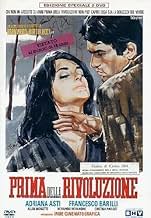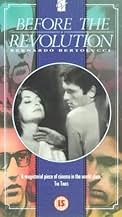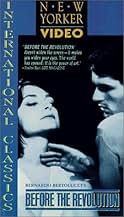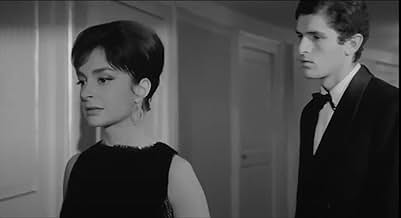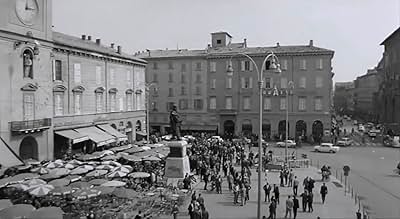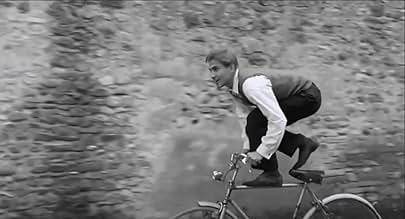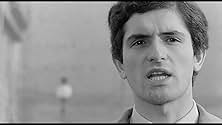IMDb RATING
6.8/10
3.4K
YOUR RATING
Following the death of his friend, an Italian youth grows increasingly closer to his young aunt.Following the death of his friend, an Italian youth grows increasingly closer to his young aunt.Following the death of his friend, an Italian youth grows increasingly closer to his young aunt.
- Director
- Writers
- Stars
- Awards
- 2 nominations total
- Director
- Writers
- All cast & crew
- Production, box office & more at IMDbPro
6.83.3K
1
2
3
4
5
6
7
8
9
10
Featured reviews
This IS the revolution
Is it immoral for a nephew and aunt to have an affair? ...who cares? - the question is barely raised. This is the Italian New Wave, a cineaste's dream; forget the story, for style is everything.
Bertolucci's second film, at age 22, still owes a lot to his mentor Pasolini, but now he has taken on board Godard of "A Woman is a Woman" and Truffaut of "Jules and Jim". It's hopelessly overloaded with style but that makes it fascinating to watch. You never know what the camera is going to do next. A long monologue by Adrianna Asti contains so many zooms, pans, cross-cuts, reverse shots, asymmetrical framing, you name it - it's insane. You stop listening to what she is saying and just wonder what on earth Bertolucci is playing at. Playing at making movies I suppose.
It's all fairly aimless but is beautifully shot and the script is quite fine. Asti seems natural as the fragile aunt and Bertolucci makes the most of her - there are moments when she's nudging Audrey Hepburn. There's plenty of gay subtext - a notable feature of many Bertolucci films, for anyone apt to enquire into such things - it certainly assists interpretation.
Hardly juvenilia; if you're in the mood, this is a near masterpiece.
Bertolucci's second film, at age 22, still owes a lot to his mentor Pasolini, but now he has taken on board Godard of "A Woman is a Woman" and Truffaut of "Jules and Jim". It's hopelessly overloaded with style but that makes it fascinating to watch. You never know what the camera is going to do next. A long monologue by Adrianna Asti contains so many zooms, pans, cross-cuts, reverse shots, asymmetrical framing, you name it - it's insane. You stop listening to what she is saying and just wonder what on earth Bertolucci is playing at. Playing at making movies I suppose.
It's all fairly aimless but is beautifully shot and the script is quite fine. Asti seems natural as the fragile aunt and Bertolucci makes the most of her - there are moments when she's nudging Audrey Hepburn. There's plenty of gay subtext - a notable feature of many Bertolucci films, for anyone apt to enquire into such things - it certainly assists interpretation.
Hardly juvenilia; if you're in the mood, this is a near masterpiece.
10zetes
One of the most stunning pieces of filmmaking I've ever seen
Before the Revolution, Bernardo Bertolucci's second film, is kind of a mess. He was only 22 when he made it, and he must have made it immediately after he finished his first film, Grim Reaper. It's obvious that he's a genius from this film. Like I said, it's kind of a mess, but no more beautiful mess has ever been created in the cinema.
The story is difficult to follow at times, but it is basically about a young bourgeois man who falls in love with his young aunt. Their relationship is socially unacceptable, so it immediately begins to break apart. As it does, politics rush into the film, confused politics, probably representing Bertolucci's own conflicting feelings at this point. The whole film feels very personal.
I don't know. I really didn't catch too much of, well, what's going on. Which sounds bad, but there's a good reason for my missing everything: Bertolucci's direction is breathtaking. It is a nice cross between French New Wave and the Modernist movement that the Italian filmmakers were going through at the time. Bertolucci throws every single cinematic trick into the film that he can fathom. Everything works, though. It's showy, to be sure, but it's never less than one of the most beautiful things I've ever experienced. It never seems less than amazing. The emotions of the film - and they really hit home, even if the story is difficult to follow - are fractured and manic.
I need to watch Before the Revolution again. I feel, though, that even if I find it completely flawed the second time around, it could be nothing less than the greatest flawed masterpiece ever produced. 10 years after Before the Revolution, Bernardo Bertolucci directed what I consider my third favorite film, Last Tango in Paris. By then, he had perfected his style. I'll be adding another Bertolucci film to my list of favorites tonight.
The story is difficult to follow at times, but it is basically about a young bourgeois man who falls in love with his young aunt. Their relationship is socially unacceptable, so it immediately begins to break apart. As it does, politics rush into the film, confused politics, probably representing Bertolucci's own conflicting feelings at this point. The whole film feels very personal.
I don't know. I really didn't catch too much of, well, what's going on. Which sounds bad, but there's a good reason for my missing everything: Bertolucci's direction is breathtaking. It is a nice cross between French New Wave and the Modernist movement that the Italian filmmakers were going through at the time. Bertolucci throws every single cinematic trick into the film that he can fathom. Everything works, though. It's showy, to be sure, but it's never less than one of the most beautiful things I've ever experienced. It never seems less than amazing. The emotions of the film - and they really hit home, even if the story is difficult to follow - are fractured and manic.
I need to watch Before the Revolution again. I feel, though, that even if I find it completely flawed the second time around, it could be nothing less than the greatest flawed masterpiece ever produced. 10 years after Before the Revolution, Bernardo Bertolucci directed what I consider my third favorite film, Last Tango in Paris. By then, he had perfected his style. I'll be adding another Bertolucci film to my list of favorites tonight.
Very early flawed but interesting work by Bertolucci
While hailed as many as a masterpiece (or near), I struggled with Bertolucci's 2nd film, made when he was only 23, although I am a fan of his in general. Beautifully shot, great use of music and unconventional editing, the film is excellent on a film-making and craft level (although it perhaps borrows too liberally from leading film-makers of the era, especially Godard, Antonioni and Resnais).
The story of a young bourgeois man trying to come to terms with his tear between his attraction to communism and his desire for an easier life leads him into an incestuous affair with his somewhat older aunt. I found it's themes somewhat muddled, alternating between being heavy-handedly spelled out, or so obtuse I wasn't sure what a given scene was saying.
The acting in particular seems a bit all over the place; understated to the point of flatness in one scene, and then almost theatrically over the top the next. At the end I felt glad I'd seen the film, but it didn't stick with me the way Bertolucci's first film "La Commare Secca" or his third "Partner" did. ("Partner" deals with some of the same themes, but in a far more playful, often comedic way). There was a film-school sort of pretentiousness and emotional distance in "Before the Revolution that kept me from feeling moved or from being led to think deeply about the ideas.
That said, I am willing to revisit it and see if my reaction changes, and certainly I enjoyed Bertolucci's already masterful use of image and sound, even if the ends he was using them to were a bit muddled.
The story of a young bourgeois man trying to come to terms with his tear between his attraction to communism and his desire for an easier life leads him into an incestuous affair with his somewhat older aunt. I found it's themes somewhat muddled, alternating between being heavy-handedly spelled out, or so obtuse I wasn't sure what a given scene was saying.
The acting in particular seems a bit all over the place; understated to the point of flatness in one scene, and then almost theatrically over the top the next. At the end I felt glad I'd seen the film, but it didn't stick with me the way Bertolucci's first film "La Commare Secca" or his third "Partner" did. ("Partner" deals with some of the same themes, but in a far more playful, often comedic way). There was a film-school sort of pretentiousness and emotional distance in "Before the Revolution that kept me from feeling moved or from being led to think deeply about the ideas.
That said, I am willing to revisit it and see if my reaction changes, and certainly I enjoyed Bertolucci's already masterful use of image and sound, even if the ends he was using them to were a bit muddled.
the charterhouse of cinema
One of the typical ploys of modernist artists has been to take a known work, and to use that as a basis for experimentation. In this case, Bernardo Bertolucci (at the age of 22!) took Stendhal's novel THE CHARTERHOUSE OF PARMA and used the basic plot and characters, only Bertolucci abstracted these elements, taking them for granted and simply creating a wide-ranging collage of impressions and emotions. But the central love affair between Fabrizio and his aunt, Gina (the names of the characters in the Stendhal), is the motivating heart of the film; the suggestions of incest, the need for secrecy, the impacted emotion because of the covertness: these provide PRIMA DELLA RIVOLUZIONE with a core of great integrity, so that the more "random" elements (the scene with the lament on the lake, the scene at the opera, the scene where the friend rides the bicycle in circles, etc.) are able to reflect on Bertolucci's feelings regarding politics, class, revolution, art, the search for belief.
PRIMA DELLA RIVOLUZIONE is one of the most youthful films ever made, as well it should be, since it was made by someone who was impossibly young at the time. I hate to say this, but it's the work of a prodigy, a gifted post-adolescent who is trying to find a form to contain his sometimes overwrought feelings about life, love, and politics. There had been many works catering to the teen crowd, movies like WHERE THE BOYS ARE or BEACH PARTY, but, aside from some of the works of Nicholas Ray (THEY LIVE BY NIGHT and REBEL WITHOUT A CAUSE), no film artist had yet tried to use the medium as a vehicle for a vision of youthful passions from the inside: Godard would follow with MASCULINE FEMININE and LA CHINOISE, Bellocchio with FISTS IN THE POCKET, Skolimowski with LE DEPART and DEEP END, but Bertolucci was pioneering when he made this movie, and the fact that it's "flawed" should not be held against it, as it represents the expression of a very young artist, trying to express his emotions as directly as possible.
PRIMA DELLA RIVOLUZIONE is one of the most youthful films ever made, as well it should be, since it was made by someone who was impossibly young at the time. I hate to say this, but it's the work of a prodigy, a gifted post-adolescent who is trying to find a form to contain his sometimes overwrought feelings about life, love, and politics. There had been many works catering to the teen crowd, movies like WHERE THE BOYS ARE or BEACH PARTY, but, aside from some of the works of Nicholas Ray (THEY LIVE BY NIGHT and REBEL WITHOUT A CAUSE), no film artist had yet tried to use the medium as a vehicle for a vision of youthful passions from the inside: Godard would follow with MASCULINE FEMININE and LA CHINOISE, Bellocchio with FISTS IN THE POCKET, Skolimowski with LE DEPART and DEEP END, but Bertolucci was pioneering when he made this movie, and the fact that it's "flawed" should not be held against it, as it represents the expression of a very young artist, trying to express his emotions as directly as possible.
A delicious French food in Italian style.
BEFORE THE REVOLUTION is a romantic drama film about the maturation of a rebellious young man who, because of his bourgeois origin, lives an easy life. This is the story of torn characters and revolutionary ideals. It is very cold review of the generation gap in Italy.
Fabrizio, a young student in Parma, examines the relations between the middle class and the Communist Party in Italy. He is traumatized by the death of his friend, who has drowned in the River Po. To make matters worse, his beautiful and ten years older aunt Gina from Milan becomes part of his love life. Fabrizio is torn between his weaknesses, aspirations, ambitions and loving care, but a life decision must be made...
Mr. Bertolucci has put a young and beautiful woman at the center of a chaotic love story, which swirls around an immature young man. That young man constantly searches his place in modern civilization flows, and rebels against everything. He comes into contact with an abstract philosophy, art and passionate love. On the other side is an unfortunate young woman, who further complicates the life of an adolescent. She only seeks his understanding and love.
The collapse of a revolution is reflected through the inability of giving and receiving love. A period of a vulnerability, emotional meltdown and alienation comes after that.
An authentic scenery and soundtrack harmoniously fit into this uncertain story.
Francesco Barilli as Fabrizio has offered a good performance of a torn young man who constantly taps in place. Adriana Asti in role of his aunt Gina has picked up my sympathies as a beautiful and unhappy young woman who plays love games with her nephew.
A delicious French food in Italian style.
Fabrizio, a young student in Parma, examines the relations between the middle class and the Communist Party in Italy. He is traumatized by the death of his friend, who has drowned in the River Po. To make matters worse, his beautiful and ten years older aunt Gina from Milan becomes part of his love life. Fabrizio is torn between his weaknesses, aspirations, ambitions and loving care, but a life decision must be made...
Mr. Bertolucci has put a young and beautiful woman at the center of a chaotic love story, which swirls around an immature young man. That young man constantly searches his place in modern civilization flows, and rebels against everything. He comes into contact with an abstract philosophy, art and passionate love. On the other side is an unfortunate young woman, who further complicates the life of an adolescent. She only seeks his understanding and love.
The collapse of a revolution is reflected through the inability of giving and receiving love. A period of a vulnerability, emotional meltdown and alienation comes after that.
An authentic scenery and soundtrack harmoniously fit into this uncertain story.
Francesco Barilli as Fabrizio has offered a good performance of a torn young man who constantly taps in place. Adriana Asti in role of his aunt Gina has picked up my sympathies as a beautiful and unhappy young woman who plays love games with her nephew.
A delicious French food in Italian style.
Did you know
- TriviaBernardo Bertolucci was only 22 when he made this film.
- ConnectionsFeatured in Nathalie... (2003)
- How long is Before the Revolution?Powered by Alexa
Details
Box office
- Gross worldwide
- $12,199
- Runtime
- 1h 45m(105 min)
- Color
- Sound mix
- Aspect ratio
- 1.85 : 1
Contribute to this page
Suggest an edit or add missing content

![Watch Trailer [OV]](https://m.media-amazon.com/images/M/MV5BNWRiN2E3YjYtNmI2MC00ZjdmLWE2N2EtYWFjYTNjZTRmZTZiXkEyXkFqcGdeQXRodW1ibmFpbC1pbml0aWFsaXplcg@@._V1_QL75_UX500_CR0)
